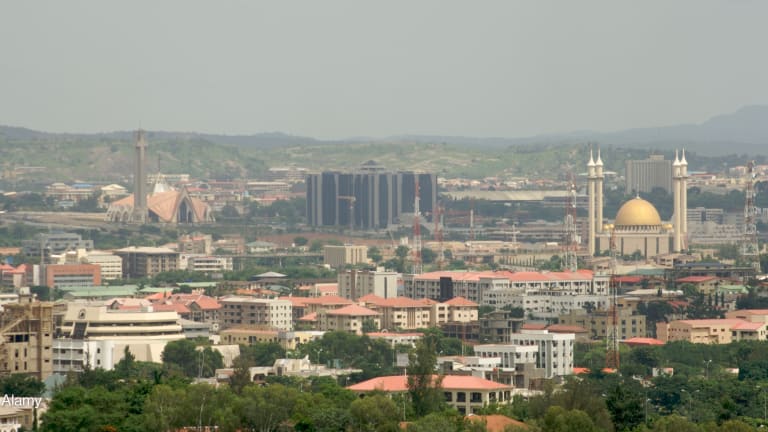
ABUJA, Nigeria — Presidential elections will be held in Nigeria on Feb. 16, with incumbent president Muhammadu Buhari of the All Progressives Congress and former Vice President Abubakar Atiku of the People’s Democratic Party as the frontrunners.
“We are looking forward with so much enthusiasm to a president who will prioritize young people, their education, [their health] and their economic participation.”
— Offor Jeremiah, country coordinator, International Youth Alliance for Family PlanningInternational development organizations believe much is at stake in this election, more so than in previous years. Dr. Eugene Kongnyuy, interim representative for the United Nations Population Fund in Nigeria, said the country finds itself with a window of opportunity to capitalize on the demographic dividend that started in the early 2000s, with its working-age population currently larger than its nonworking age population. But that window of opportunity will close around 2035, he suggested, meaning Nigeria must put the resources and investment in the right places now.
In particular, Nigeria needs to ensure the fertility rate is dropping; that it is investing in the health of its people; and that it is boosting the private sector to create employment. “When these [things] happen, Nigeria will be free from poverty,” Kongnyuy said. It cannot afford to get it wrong, he added.
When it comes to development, the leading candidates have made similar promises on several key issues. Both manifestos prioritize job creation, infrastructure, and human capital, while Atiku has an additional focus on poverty eradication, and Buhari on entrepreneurship and political inclusion.
Local and international NGOs are supportive of the focus on jobs. In conversations with Devex, they emphasized the importance of a good policy environment in creating work for the country’s booming youth population — the median age in Nigeria is just under 18 years old.
“Ninety percent of employment will come from the private sector. The private sector can only prosper if the government has the right policies” in place, Kongnyuy explained.
But other priorities for development groups — including disease surveillance; reducing Nigeria’s maternal mortality rate, which is among the highest in the world; expanding access to sexual and reproductive health and rights; and securing more domestic funding for the national health system — have received less attention, with both candidates remaining largely silent on health issues during their campaigns.
Nigeria faces a health financing cliff edge
Nigeria remains heavily reliant on foreign funding for programs tackling polio, malaria, HIV, and more. Is it ready for those flows to stop?
Many international organizations were hoping to see more domestic funding dedicated to these issues, pointing to Nigeria’s heavy reliance on foreign donors for its development efforts. That makes the country highly vulnerable to changes in the policies and priorities of foreign governments and donor organizations, they say, and is concerning especially as Nigeria is due to lose eligibility for several sources of foreign funding over the next two decades.
In the lead up to the election, UNFPA has been working to drum up support for the Abuja Declaration, which recommends that 15 percent of national budgets is dedicated to health, and which Nigeria is theoretically signed up to. If this target were met, UNFPA believes the country would be able to self-finance many of its health needs, including reproductive health, as part of its investment in the future.
There is an economic case for this investment. Life expectancy in Nigeria currently stands at 55 years, placing it 178th in the world. “In other countries, people are living to 80-something years and are putting the amount of skills they have acquired into the economy. There is no way we will end poverty if people are dying very early. It should be a priority,” Kongnyuy explained.
He also stressed the importance of prioritizing education, especially for young girls. “When we have more people working, they will be able to take care of their families, they will even send their children to school to have better education, and they can even save more money — the family becomes more prosperous, and the nation is also prosperous,” the UNFPA representative said.
Local NGOs that spoke to Devex also emphasized the need for more inclusive policies. Offor Jeremiah, country coordinator at the International Youth Alliance for Family Planning, decried the lack of inclusion for young Nigerians in the implementation of many government policies.
“We are looking forward with so much enthusiasm to a president who will prioritize young people, their education, [their health] and their economic participation. We are expecting a [leader who] will meaningfully engage and work with young people in key decision-making processes,” he said.
With Nigeria on the threshold of a strategic opportunity, the country’s leaders must prioritize the health and education of the young people who make up the majority of the population, “as they can transition from this young age into a skilled labor force,” Jeremiah said. “According to a World Bank report ... if Nigeria can invest in its young people, it would have the largest workforce in the world by 2050.”
A cross section of local groups told Devex they hoped the election would raise the government’s awareness of some of the major challenges facing citizens — leading to greater commitment and resources for solving local problems.
But many stakeholders feel that political jostling has overshadowed real development issues during the campaign period. Some said that past promises on development issues have often not been kept, meaning they now receive less attention.
Social commentator Adedoyin Tella also pointed to a problem with accountability. The political parties and their candidates have released separate policy documents containing different pledges, including on development. As a result, it is difficult for voters to know what to expect from the eventual victor.








